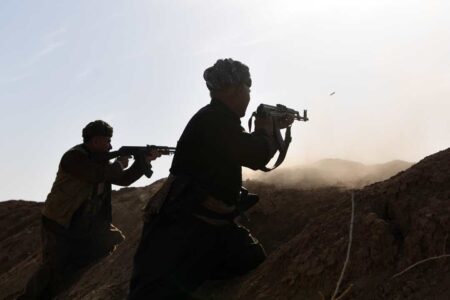
The Islamic State is using the coronavirus distraction to rearm and regroup
Is the Islamic State still a threat? That question has percolated in policy circles ever since the United States and coalition allies succeeded in dismantling the physical caliphate of the world’s most notorious terrorist group in Iraq and Syria in the spring of 2019.
To be sure, U.S. officials have been quick to contextualize their victory, depicting it simply as the end of the territorial stage of the group. Yet there has been an undeniable sense over the past year that we have turned the page on the “war on terror,” freeing us up to focus on other priorities, like strategic competition with China.
Yet in war, the adversary also gets a vote, and recent months have seen new signs of life from the terror organization. This resurgence, showcased in a growing number of attacks by ISIS-affiliated elements in Iraq and disruptive activities in areas of Syria nominally under regime control, have raised considerable worries in Washington. They have also indicated that ISIS, though diminished, is still viable — and dangerous.
Exactly how much was made clear this week, courtesy of a new assessment from the United Nations. Currently, the UN’s counter-terrorism chief, Vladimir Voronkov, has disclosed, there are more than 10,000 Islamic State fighters actively operating in Iraq and Syria. Moreover, Voronkov noted, thousands more have migrated to join the group’s various regional affiliates now scattered around the world – including the Islamic State’s West Africa Province (ISWAP), which now boasts some 3,500 men under arms.
In other words, for all of its current problems, ISIS still retains a formidable cadre of fighters and adherents loyal to its cause. By way of context, a July 2018 study by the International Centre for the Study of Radicalisation, a respected British think tank, estimated that nearly 42,000 foreign fighters from 80 different countries had joined up with ISIS over the course of its short-lived reign.
Today, that figure has been significantly diminished as a result of counter-terrorism operations by the U.S. and its regional partners that have killed or captured ISIS militants and affiliates. But even at half strength, the Islamic State represents a formidable adversary — and a threat to regional stability both in the Middle East and beyond.
In fact, the danger from ISIS is now poised to grow, as the group adapts to exploit the coronavirus pandemic by ramping up its online messaging and recruitment efforts to take advantage of captive audiences kept home by national lockdowns and social distancing measures.
“Measures to minimize the spread of COVID-19, such as lockdowns and restrictions on movement, seem to have reduced the risk of terrorist attacks in many countries,” Voronkov noted in his presentation. However, there is now “a continued trend of attacks by individuals inspired online and acting alone or in small groups, which could be fueled by ISIL’s opportunistic propaganda efforts during the COVID-19 crisis.”
In turn, the Islamic State’s ideological outreach is likely to be amplified by the deleterious effects of the pandemic. Already, the coronavirus is causing mounting economic hardship and growing social insecurity throughout the Middle East and Africa.
In places like Tunisia, Egypt and Libya, soaring unemployment, deepening poverty, and rampant inflation are setting the stage for significant domestic unrest — and expanding the potential for radicalization. All of which means that those nations, and the international community at large, could face a COVID-19-driven surge of extremism in the near future.
ISIS, meanwhile, is seeking to reclaim its former status as a state. “ISIL continues to build up its combat potential and is seeking to expand the area and scope of terrorist attacks in the country,” says Vasily Nebenzya, Russia’s ambassador to the UN. Nebenzya would know, since his government is a major military partner of the Syrian regime on whose territory ISIS is seeking to make a comeback.
But the problem isn’t localized to the Levant. The Islamic State “has now fully transformed into a network structure with a high degree of autonomy of branches and `sleeping cells’ in various countries and regions of the world,” the Russian envoy notes.
In other words, though diminished by counter-terrorism measures and temporarily sidelined by the pandemic, the Islamic State is hardly defunct. Rather, the organization has proven itself to be both resilient and adaptive. As such, it remains a long-term problem for the United States and its regional partners.
Source: USA Today





